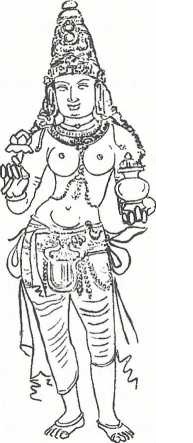By Swami Harshananda
Annupurṇā literally means ‘filled with food’.
If God is the creator of this universe, his power with which he creates, is pictured as a female deity, his consort, usually is called as Śakti. Most of the female deities or goddesses of the pantheon are the aspects of Pārvatī, the consort of Śiva, the third deity of the Trinity, responsible for destruction and dissolution of the universe.
Annupurṇā, the possessor and giver of food, is one of the important aspects of Pārvatī. She got this name since she served anna or food to Lord Śiva himself when he was roaming about as a mendicant. She is shown as serving food from a vessel of ruby.
Iconographically, she may be shown with four hands also, two hands holding pāśa (noose) and paraśu (battle-axe) and the other two showing the varada (boon- giving) and abhaya (protection from fear) mudrās.
Her worship ensures that the house will never lack in food. Her festival is usually observed in Caitra (April), mostly in Bengal. Her temple at Kāśī (Vārāṇasī, modern Banaras in Uttar Pradesh) is very famous.
References[edit]
- The Concise Encyclopedia of Hinduism, Swami Harshananda, Ram Krishna Math, Bangalore

